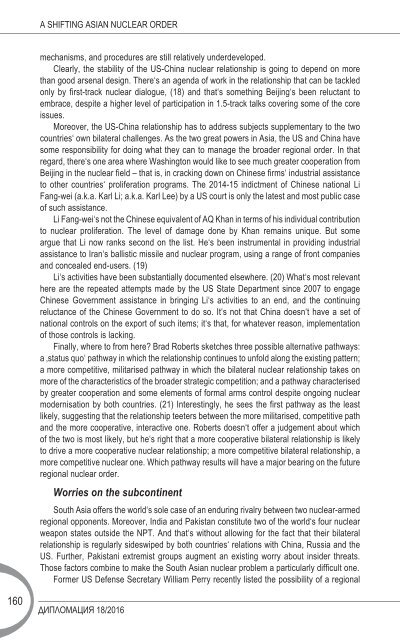DIPLOMACY ДИПЛОМАЦИЯ
2kGfdFv
2kGfdFv
You also want an ePaper? Increase the reach of your titles
YUMPU automatically turns print PDFs into web optimized ePapers that Google loves.
A SHIFTING ASIAN NUCLEAR ORDER<br />
mechanisms, and procedures are still relatively underdeveloped.<br />
Clearly, the stability of the US-China nuclear relationship is going to depend on more<br />
than good arsenal design. There’s an agenda of work in the relationship that can be tackled<br />
only by first-track nuclear dialogue, (18) and that’s something Beijing’s been reluctant to<br />
embrace, despite a higher level of participation in 1.5-track talks covering some of the core<br />
issues.<br />
Moreover, the US-China relationship has to address subjects supplementary to the two<br />
countries’ own bilateral challenges. As the two great powers in Asia, the US and China have<br />
some responsibility for doing what they can to manage the broader regional order. In that<br />
regard, there’s one area where Washington would like to see much greater cooperation from<br />
Beijing in the nuclear field – that is, in cracking down on Chinese firms’ industrial assistance<br />
to other countries’ proliferation programs. The 2014-15 indictment of Chinese national Li<br />
Fang-wei (a.k.a. Karl Li; a.k.a. Karl Lee) by a US court is only the latest and most public case<br />
of such assistance.<br />
Li Fang-wei’s not the Chinese equivalent of AQ Khan in terms of his individual contribution<br />
to nuclear proliferation. The level of damage done by Khan remains unique. But some<br />
argue that Li now ranks second on the list. He’s been instrumental in providing industrial<br />
assistance to Iran’s ballistic missile and nuclear program, using a range of front companies<br />
and concealed end-users. (19)<br />
Li’s activities have been substantially documented elsewhere. (20) What’s most relevant<br />
here are the repeated attempts made by the US State Department since 2007 to engage<br />
Chinese Government assistance in bringing Li’s activities to an end, and the continuing<br />
reluctance of the Chinese Government to do so. It’s not that China doesn’t have a set of<br />
national controls on the export of such items; it’s that, for whatever reason, implementation<br />
of those controls is lacking.<br />
Finally, where to from here? Brad Roberts sketches three possible alternative pathways:<br />
a ‘status quo’ pathway in which the relationship continues to unfold along the existing pattern;<br />
a more competitive, militarised pathway in which the bilateral nuclear relationship takes on<br />
more of the characteristics of the broader strategic competition; and a pathway characterised<br />
by greater cooperation and some elements of formal arms control despite ongoing nuclear<br />
modernisation by both countries. (21) Interestingly, he sees the first pathway as the least<br />
likely, suggesting that the relationship teeters between the more militarised, competitive path<br />
and the more cooperative, interactive one. Roberts doesn’t offer a judgement about which<br />
of the two is most likely, but he’s right that a more cooperative bilateral relationship is likely<br />
to drive a more cooperative nuclear relationship; a more competitive bilateral relationship, a<br />
more competitive nuclear one. Which pathway results will have a major bearing on the future<br />
regional nuclear order.<br />
Worries on the subcontinent<br />
South Asia offers the world’s sole case of an enduring rivalry between two nuclear-armed<br />
regional opponents. Moreover, India and Pakistan constitute two of the world’s four nuclear<br />
weapon states outside the NPT. And that’s without allowing for the fact that their bilateral<br />
relationship is regularly sideswiped by both countries’ relations with China, Russia and the<br />
US. Further, Pakistani extremist groups augment an existing worry about insider threats.<br />
Those factors combine to make the South Asian nuclear problem a particularly difficult one.<br />
Former US Defense Secretary William Perry recently listed the possibility of a regional<br />
160<br />
<strong>ДИПЛОМАЦИЯ</strong> 18/2016


